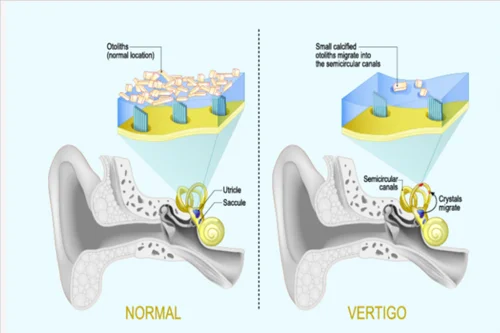Vertigo
Vertigo

Vertigo is a type of dizziness that gives you the false feeling that you or your surroundings are moving or spinning, even when everything is still. It’s not just lightheadedness — it’s a disturbing sensation of motion that can affect your balance, make you feel unsteady, and even lead to falls. Vertigo can come on suddenly and last for seconds, minutes, or even hours, depending on the cause.
Common Causes of vertigo
- Benign Paroxysmal Positional Vertigo (BPPV) : The most common cause. It happens when tiny crystals in the inner ear move into the wrong place, triggering vertigo with certain head movements.
- Meniere’s disease : A build-up of fluid in the inner ear that causes vertigo, hearing loss, and ear ringing (tinnitus).
- Vestibular neuritis or labyrinthitis : Inflammation of the balance nerve, usually due to a viral infection.
- Migraine-associated vertigo : Some people get vertigo as part of a migraine attack.
Common symptoms of vertigo
- A spinning or swaying sensation, even when you are still
- Nausea or vomiting
- Trouble walking, unsteadiness, or feeling like you might fall
- Sweating, headache, or ringing in the ears (in some cases)
- Eyes may move uncontrollably (nystagmus) during an attack
How does cholesteatoma grow silently?
Cholesteatoma often grows slowly and painlessly at first, so many people don’t realize they have it. The skin cells inside the ear keep collecting and form a cyst-like sac. This sac produces enzymes that can destroy bone and tissue. That’s why even though it may seem like just a stubborn ear discharge, cholesteatoma can quietly cause serious damage over time.
How is vertigo treated?
- Depends on the cause : options include medicines, physical therapy (like Epley’s maneuver for BPPV), or managing underlying conditions (like migraine or Meniere’s disease).
- BPPV : Special head and body movements (like the Epley maneuver) can move the loose crystals back to where they belong.
- Vestibular neuritis : Medications to reduce dizziness and nausea, along with balance exercises.
Vertigo can feel frightening, but the good news is that it’s often treatable once the cause is found. If you or a loved one is experiencing repeated dizziness or a spinning sensation, don’t ignore it. Early medical care can help you feel steady, safe, and confident again. Book an appointment with our specialist today and take the first step toward better balance.
